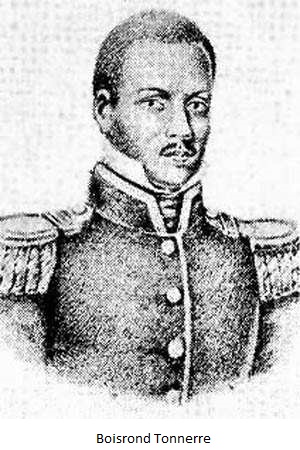CSMS Magazine
Love is a mutually inclusive emotion grounded in pure devotion, trust and unexplained feelings. When love is patriotic, it contains a higher element which makes it holy: a brotherly, sisterly love enshrined in a saintly commitment to save—if need be—what unites us. And what unites us is a roughly 10 thousand square miles of land that our forefathers conquered against all odds more than 200 years ago, breaking the chain of bondage, so that we could live freely, happily ever after. This is the fact—the irrefutable fact—that will forever craft the history of Haiti.
Despite all the bad acronyms attributed to Dessalines by the colonial powers in their attempt to rewrite the narrative, the father of the Haitian nation was very pragmatic towards his fellow countrymen, as many historians conceded. As a father, he understood and played his role, sheltering his children—mulattoes and blacks and whites (Polish and German)—against possible foreign invasions. The emphasis on keeping foreign interference at bay was so great that within 2 years after independence, Haiti built more forts along its seaboard than the island had ever built pre-independence era.
Leading the campaign to fortify Haiti was a group of intellectuals like Joseph Ogé, a quadroon mulatto, Juste Chanlatte, Boisrond Tonnerre etc…Their job was to create a framework from which the foundation of Haiti could be built. This group of young energetic Haitians accomplished their task with boundless patriotism. Who can forget this famous quote from Boisrond Tonnerre on Independence Day January 1st 1804? He was tall with a muscular frame molded inside his nut-brown tan. Alert but fearless, he was stroking his dark wavy hair with an unforeseen adroitness. His African lineage aglow, and with an unfaltering glance, he rose under waves of military salvos as the victorious, indigenous army at one of its finest moments in history stood erect and proud. His body quivered a bit, lurching sideways, Boisrond smiled before delivering these forever famous words:
« Pour rédiger l’acte de l’indépendance, il nous faut la peau d’un blanc pour parchemin, son sang pour encre, son crane pour écritoire et une baïonnette pour plume. » (“To write this declaration of independence, we need the skin of a white man as parchment, his blood as ink, his skull as an inkwell and a bayonet as pen.”)
Whatever happened to these brand of Haitians? Two hundred years later, like a haunting memory, Boisrond’s words still linger, running to the veins of millions, but powerless Haitians as they watch their country being reduced to its lowest form of expression—a place where people live, but not a country guided by laws from which social security, freedom and independence are safeguarded. No one needs to be a citizen with profound patriotic zeal to know when his country is going down the drain. Haiti is heading towards what seems an endless dark hole—an everlasting continuum, a doomed airplane on a nosedive toward its crash site.
Those at the driver seat of Haiti, piloting it, purposely chose this path—the path to mendacity and self-enrichment, the path to betrayal and slavish submission and the path to oblivion as millions of their fellow countrymen go hungry every day. It’s a travesty.
They say they love Haiti, but their love is only skin-deep like a shallow bay near a sandy shoal. They say they are highly educated, smart, clever, shrewd, but their intelligence seems tributary to the ignorance of foreign diplomats stationed in their country. They understand one logic: Playing dummy will secure their position, fulfill their lofty ambitions and shield them from popular retributions.
Speaking of American “goodwill,” this is how historian Thomas Madiou describes American hypocrisy and interference in 1805:
“Ce n’était pas véritablement la philantropie qui les portait à cette bienveillance………..; c’était l’intérèt, car ils maintenaient alors, comme aujourd’hui, dans la servitude ou la dégradation, les noirs et les hommes de couleur de l’Union.” (Histoire D’Haiti, Volume 3, page 236)
“It was not truly the spirit of philanthropy that guided them towards these acts of goodwill……; it was their own selfish interests, for they still maintain in bondage or in degradation, all blacks and colored people in their country.” History of Haiti, Volume 3, page 236.
With so many “Foundations” operating in Haiti today, one would think the country is on a fast-track to paradise, with its old glory within striking distance. But you and I know it is just a gimmick, a deceptive ploy to ultimately tame millions of Haitians who wallow in poverty every day.
Brother, it is a plea. Let’s stand united in the face of neocolonialism. Our forefathers have long gone, but they stand to face a second death if we remain idle and let Haiti bloat out of existence.
Also see, Solitude
Note: Dr. Ardain Isma is Chief-Editor of CSMS Magazine. He is a novelist. His latest work of fiction, titled Midnight at Noon, is a critically acclaimed and powerful novel that describes horrific tales of raw exploitation in Haiti and what can be done to rescue Haiti from the brink. To order a copy, click here: Midnight at Noon. Dr. Isma is also a scholar who teaches Cross-Cultural Studies at UNF. He can be reached at publisher@csmsmagazine.org Also, like us on Facebook: www.facebook.com/csmsmagazine



This article touches the nerve! This is the question I have always asked myself: Whatever happened to those powerful Haitians? I would agree with you, Dr. Isma. What’s Happening right now to Haiti is a travesty.